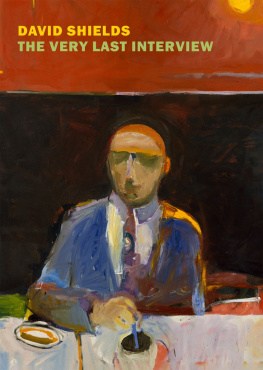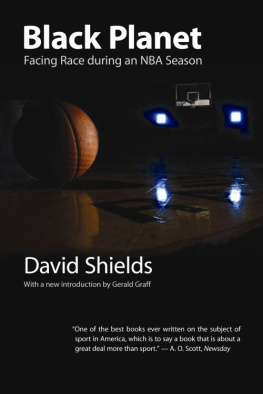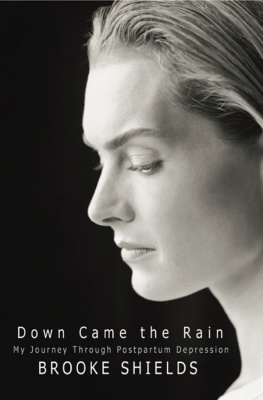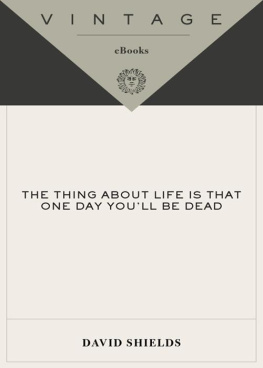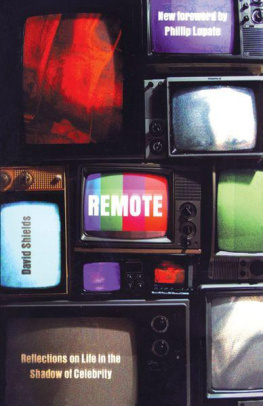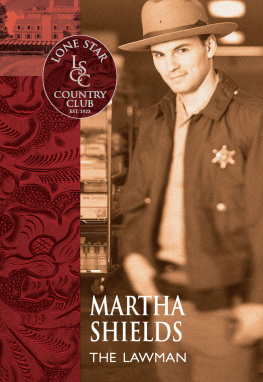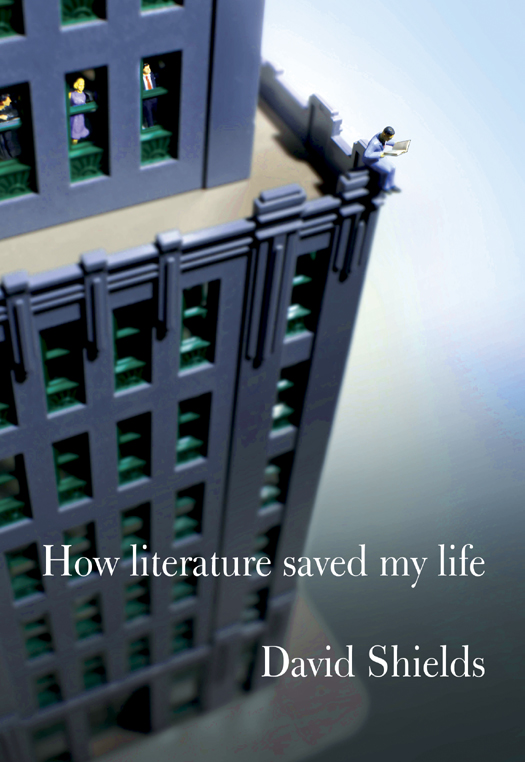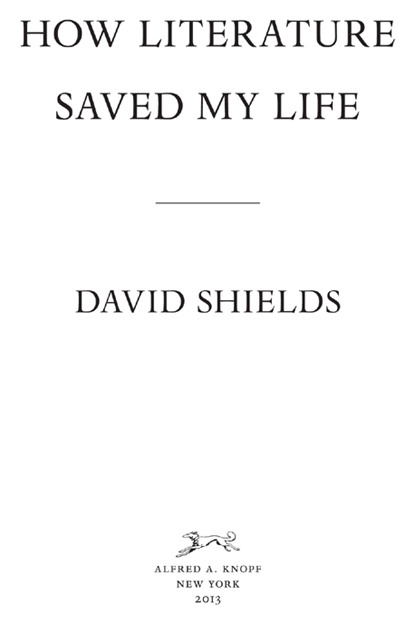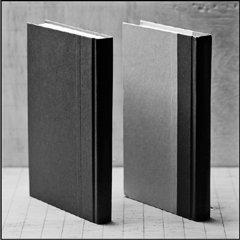THIS IS A BORZOI BOOK
PUBLISHED BY ALFRED A. KNOPF
Copyright 2013 by David Shields
All rights reserved. Published in the United States by Alfred A. Knopf, a division of Random House, Inc., New York, and in Canada by Random House of Canada, Limited, Toronto.
www.aaknopf.com
Knopf, Borzoi Books, and the colophon are registered trademarks of Random House, Inc.
constitutes an extension of this page.
Library of Congress Cataloging-in-Publication Data
Shields, David, 1956
How literature saved my life / by David Shields. 1st ed.
p. cm.
This is a Borzoi book.
eISBN: 978-0-307-96153-2
1. Shields, David, 1956Books and reading.
2. Influence (Literary, artistic, etc.)
3. Criticism. I. Title.
P S3569.H4834Z469 2013
813.54dc23
[ B ] 2012036686
Internal photo series by Tom Collicott and David Shields
Front-of-jacket photograph by Geoff Spear
Jacket design by Chip Kidd
v3.1_r1
For L.
I am deeply grateful for a fellowship from the John Simon Guggenheim Foundation.
CONTENTS
In which I discuss another book as a way to throw into bold relief what this book is about.
In which I evoke my character and personality, especially the way I always argue against myself, am ridiculously ambivalentwho knew?
In which I characterize love as a religion w/fallible gods.
Exploration of melancholy, in myself and the general populace.
Partial answer to question asked in previous chapter: were the only animal that knows it will die.
In which I make various self-destructive gestures, flirt none too successfully or seriously with suicide, pull back from the brink via the written word.
The only books I care about strip the writer naked and, in that way, have at least the chance of conveying some real knowledge of our shared predicament.
Do I still love literature?
How it didnt.
PROLOGUE
In which I discuss another book as a way to throw into bold relief what this book is about.
A LL CRITICISM is a form of autobiography.
Ive never met the poet Ben Lerner, though we trade email now and then, since were interested in each others work. In my case, interested is a bit of an understatement. Im obsessed with him as my doppelgnger of the next generation. Both of us went to Brown, have lived in Spain, are Jewish. I wasnt born in Topeka, as he was, but growing up in a northern California suburb felt as far removed from Oz as Kansas. Both of us are writers and critics. Both of us have/had accomplished mothers and dreamier fathers. Above all, both of us are in agony over the incommensurability of language and experience and our detachment from our own emotions.
Bens most recent book, Leaving the Atocha Station, is nominally a novel but thick with roman clef references to his childhood in Topeka, his undergraduate and graduate years in Providence, his Fulbright year in Madrid, his essay on the Library of America edition of John Ashberys poetry (which includes the poem Leaving the Atocha Station), his poet friends Cyrus Console and Geoffrey G. OBrien, his psychologist parents (his mother is the feminist writer Harriet Lerner). Im going to go ahead and treat the novels narrator, Adam, as if he were Ben. Ben wont mind!
His bookas what serious book is not?is born of genuine despair. Adam/Ben wonders if his poems are so many suicide notes. If the actual were ever to replace art, hed swallow a bottle of white pills. If he cant believe in poetry, hell close up shop. You and me both, pal.
Leaving the Atocha Station chronicles the endemic disease of our time: the difficulty of feeling, a perfect phrase a reviewer once used to describe an imperfect book of mine. Ben never lies about how hard it is to leave the stationto get past oneself to anything at all. He incessantly wonders what it would be like to look at himself from anothers perspective, imagining I was a passenger who could see me looking up at myself looking down. He wants to take everything personally until his personality dissolves and he can say yes to everything. Ben has never come anywhere near such an apotheosis. Neither have I. When I was a little kid, I was a very good baseball player, but I mostly preferred to go over to the park across from our house, sit atop the hill, and watch Little Leaguers, kids my age or younger, play for hours. Whats the matter with you? my father would ask me. You should be out there playing. You shouldnt be watching. I dont know whats the matter with mewhy Im so adept at distance, why I feel so remote from things, why life feels like a rumorbut playing has somehow always struck me as a fantastically unfulfilling activity.
What is actual when our experiences are mediated by language, technology, medication, and the arts? Is poetry an essential art form, or merely a screen for the readers projections? Ive lifted these two sentences from the flap copy (surely written by Lerner). The nature of language itself is a major part of Adams problem: hes unable to settle on the right word in English, unable to understand Spanish, revels in mistranslation as a bottomlessly rich metaphor for all miscommunication. An unfortunate fact about stutteringthe subject of my autobiographical novel, Dead Languages, published when I was the same age Ben is nowis that it prevents me from ever entirely losing self-consciousness when expressing such traditional and truly important emotions as love, hate, joy, and deep pain. Always first aware not of the naked feeling itself but of the best way to phrase the feeling so as to avoid verbal repetition, Ive come to think of emotions as belonging to other people, being the worlds happy property, not mine except by way of disingenuous circumlocution.
About the 2004 Madrid bombingsthree of the bombs exploded in the Atocha StationBen says, When history came alive, I was sleeping in the Ritz. He wonders if hell be the only American in history who visits Granada without seeing the Alhambra. While Spain is voting, hes checking email. Easy enough to judge him. Harder to acknowledge the near universality of such lassitude. In the fall of 1974 I left the Bay Area to go to college in Providence, Rhode Island, which I imagined as, quite literally, Providencea heavenly city populated by seraphic souls. I imagined Rhode Island as a literal island, the exotic edge of the eastern coast. And I saw Brown as an enclosed, paradisiacal space in which strong boys played rugby on fields of snow, then read Ruskin by gaslight in marble libraries too old to close, and girls with thick dark hair, good bodies, and great minds talked about Goethe (which I thought was pronounced Go-eth) at breakfast. The first month of my first semester, black students occupied the administration building and demanded increases in black student enrollment and financial aid. These seemed to me laudable goals, so I went over to become part of the picket line outside the building and marched in a circle, chanting, for a few minutes, but the whole event felt like a really weak imitation of all the demonstrations Id been going to since I was six years old, and I wanted to get away from groups and the West Coast and my former milieu for a while. A few people from my dorm were tossing around a Frisbee on the back side of the green. I left the picket line to go join them.


